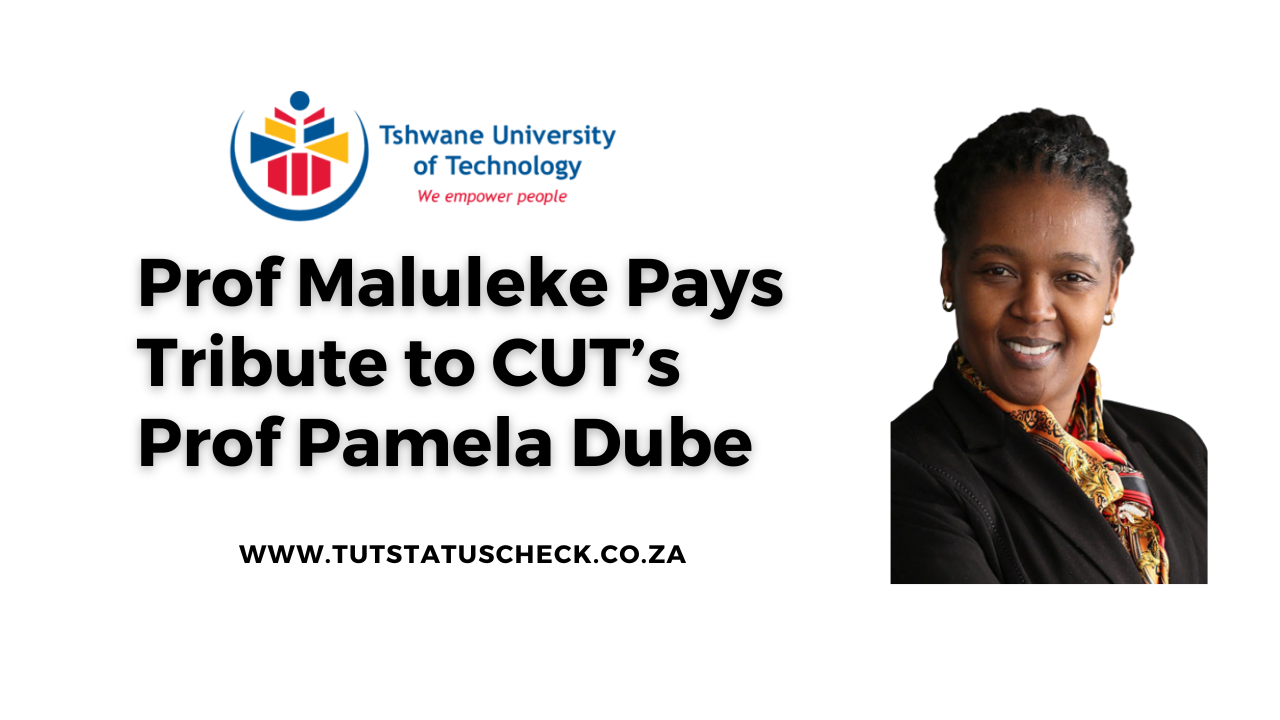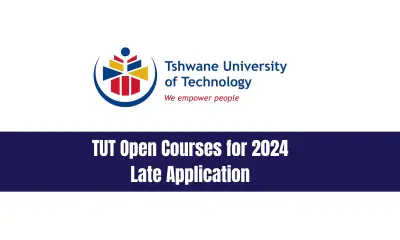TUT News
Prof Maluleke Pays Tribute to CUT’s Prof Pamela Dube
Published
7 months agoon
By
tut status
The Vice Chancellor Principal of Central University of Technology, Pamela Zibuyile Dube, has followed her life’s dreams along her own Yellow Brick Road. She built her journey on the lessons she learned from her childhood home: that a successful negotiation of one’s place in the world requires nurturing and appreciating one’s own identity — and that one should always seek to live a life of service and purpose.
Prof Maluleke Pays Tribute to CUT’s Prof Pamela Dube
KwaMakhutha township, south of the port city of Durban, is dotted with yellow brick roads that snake and slither along its length and breadth. In the direction of Amanzimtoti, the yellow brick road weaves between seaside hamlets, zigzagging through valleys and hills and weaving through the hamlet of Isipingo.

Central University of Technology’s Vice-Chancellor Prof Pamela Dube.
There is no way for the naked eye to observe the KwaMakhutha yellow brick road. Only those with discerning eyes and an eye for detail can see this road steeped in folklore myths. The yellow brick road was as tangible as the Amanzimtoti River to young Pamela Zibuyile Dube, born and raised in Section 8 KwaMaKhutha.
Pamela’s only sibling and sister, Penelope Ntombizethu Dube, remember a particular childhood memory. They watched the stage adaptation of The Wizard of Oz with their father, Sipho Matthew Dube, in Durban. Durban’s very first black theatre and cinema were opened to black people on this occasion. Theaters and cinemas were once the exclusive domain of white people.
During Pamela’s later reading of Lyman Frank Baum’s original children’s book, The Wonderful Wizard of Oz, a play inspired by it, she was transported into a profound reverie about the yellow brick road that would take her beyond the confines of the KwaMaKhutha and its violent culture. Her dreams began to take her to a world free from patriarchy; a world that would be free of apartheid; a world where Pamela would not be judged based on the colour of her skin but on her character, as Martin Luther King Jnr once said.
Escape through education
She started her schooling at KwaMakhutha’s Habiyana Lower Primary and later attended eGugwini Higher Primary at KwaMakhutha, and has never looked back since. Bab’ Dlamini, uGoba-Msenge, principal of eGugwini Higher Primary, and Maam Madlala, her grade one teacher at Habiyana Lower Primary, were her childhood role models.
She was most inspired by her parents. Pamela’s father, Sipho Dube, was born in kwaMaphumulo, Stanger, a descendant of MaNgidi. The man loved reading, even though he wasn’t highly educated, and was very particular about the quality of isiZulu in his home. Thembeni Beauty Ntuli, was the daughter of UMnini shoemaker Amon Ntuli, who was a professional nurse. Learning was a lifelong pursuit for her.
Their two daughters were raised to be strong, ambitious and assertive by the Dubes. However patriarchal the prevailing milieu was, Sipho Dube was a fully involved father who walked the girls to school, helped with their homework, and cooked for them, while his wife worked shifts or continued her nursing education.
Young Pamela’s sharp mind was ignited when her mother miraculously slipped her into Amanzimtoti’s only book exchange facility – which was only open to whites then. “Strange and curious black girl” was a frequent visitor who read voraciously, and the old white lady in charge liked her.
Thus, Pamela was introduced to such writers as Enid Blyton (The Secret Seven), John Steinbeck (The Pearl), Lewis Carroll (Alice’s Adventures in Wonderland), Laura Ingalls Wilder (Little House on the Prairie) and Layman Frank Baum (The Wonderful Wizard of Oz). Later, Judy Garland played Dorothy Gale, the girl who was destined for, and determined to reach, Oz, in the Hollywood blockbuster The Wizard of Oz.
Even though Pamela and her sister Penelope had a difficult childhood, lacking access to funds and quality higher education, they had a happy childhood filled with books and stories that inspired them. A few years later, Pamela’s own daughter Azande would join this nurturing family. She made many friends along the way, but her best and most dependable friends were always, her late parents, her sister Penelope, her daughter Azande, and her mountain of books.
It wasn’t until 1980 that Pamela Dube’s beautiful life took a dramatic turn, as she was admitted to the famous Inanda Seminary, which had a real library for the first time in her life – the dream school for all book lovers.
When Pamela was matriculating at the Seminary, she was the most well-read student in her class academically and socially. At this time, she was well versed in, and had access to the growing African literature of the likes of Wole Soyinka (Death and the King’s Horseman), Chinua Achebe (Things Fall Apart), Ngugi wa Thiong’o (Weep not Child), Nadine Gordimer (July’s People), Ayi Kwei Armah (The Beautyful Ones are Not Yet Born), Toni Morrison (The Bluest Eyes), Amos Tutuola (The Palm Wine Drinkard), Sol Plaatje (Mhudi), Miriam Tlali (Between Two Worlds), Es’kia Mphahlele (Down Second Avenue), Ama Atoo Aidoo (Our Sister Kiljoy), and Buchi Emecheta (Second Class Citizen), amongst many others.
The apartheid era upheavals in her hometown were protected from the worst forms of political violence in this world. While attending boarding school in the late 1980s, Dube witnessed horrible killings in KwaMakhuta, especially the 21 January 1987 massacre.
Her academic and leadership abilities were excellent at Inanda Seminary. She reminisces fondly about being the timekeeper for Inanda Seminary, one of her favorite roles. During her tenure as tower-bell ringer, she rang first at 5am, then last at 9pm. She realized, like life itself, that time is one of our most valuable gifts. It has been deeply ingrained in the soul of Pamela Dube that the Inanda Seminary motto is “shine where you are”.
Journey of accomplishment
Now fast-forward to 2010 and you’ll meet Pamela Zibuyile Dube, who oozes confidence as the University of Johannesburg’s Executive Director, Human Resources. In 2013, Dube was promoted to the position of Dean of Students at Wits University. The University of the Western Cape appointed Pamela Dube as Deputy Vice Chancellor, Student Development and Support in 2015.
Academically, Dube is an outstanding scholar. Pamela Dube has an impressive portfolio of academic publications, having earned a PhD in Comparative Literature from Siegen University, one of the top one thousand universities in the world. Her academic leadership track record has been filled with firsts in academic leadership, for which she has been a recipient of many accolades. Let us flash back to January 2023 and meet Pamela Dube, the Vice-Chancellor Principal of Central University of Technology, resplendent in the blue, red, and yellow colors of the 42-year-old institution.
As her role as Vice-Chancellor marks the culmination of her long journey along the yellow brick road, it is tempting to conclude that she is at the top of her game. Perhaps not yet. Oz still beckons from its magical land. A formidable team of pilgrims will be formed along the yellow brick road through Dube’s unique brand of transformative leadership, composed of “scarecrows”, “tin men”, and “cowardly lions”.
According to Dube, one of the most important lessons her parents taught her was the importance of leading a life of purpose and service. A person’s identity must also be nurtured and appreciated if they are to successfully negotiate their place in the world.
To share Alicia Keys’ somewhat irreverent words with Pamela Dube, I would like to say “this girl is (still) on fire … seems like a girl, but she is a flame”, burning quietly, but furiously. Prof. Pamela Zibuyile Dube is a gifted, capable and experienced leader at the Central University of Technology.

For more information on the Tshwane University of Technology, please contact Phaphama Tshisikhawe, Corporate Affairs and Marketing.
Tel: +27 12 382 4711 Email: [email protected]

TUT FM Celebrating 30 Years of Student Driven Radio and Community Engagement

TUT Alumnus Appointed President Of PRISA

TUT Honors Late Student Activist Matikweni For Fight Academic Exclusion

TUT Employment Application Form 2024

Masterclass with Renowned Interior Design Experts Inspires TUT Students

Buttons & Bows Celebration of Vintage Xhosa Textiles and Artefacts

Groundbreaking Partnership Between King’s College London and Tshwane University of Technology

TUT Part-Time Lecturer in Dental Technology (X4)

TUT 2025 Prospectus Tshwane University of Technology

TUT Students Register Now and secure your NSFAS Allowance

TUT Granted Hemp Permits on Cultivation and Commercialisation

TUT Partners with NYDA on Work Integrated Learning Project

TUT Courses That Still Have Space for 2024 Apply Now

TUT Late Application for 2024-2025 Academic Year

TUT Open Courses for 2024 Late Application

TUT Requirements for Teaching for 2024 Apply Now

TUT Short Course That Still Have Space for 2024 Apply Now

Which Diploma Courses are Still Available at TUT

TUT Bridging Courses 2023/2024, Tshwane University of Technology
TUT Online Application Fee 2023/2024

Which Courses are Available for Late Application at TUT?

TUT ITs Login Tshwane University of Technology

TUT Post Graduate Diploma Still Have Space for 2024

TUT Course List You Qualify for With Your Marks | Apply Now
Trending
-

 TUT News6 days ago
TUT News6 days agoTUT Courses That Still Have Space for 2024 Apply Now
-

 TUT News6 days ago
TUT News6 days agoTUT Late Application for 2024-2025 Academic Year
-

 TUT News6 days ago
TUT News6 days agoTUT Open Courses for 2024 Late Application
-

 TUT6 days ago
TUT6 days agoTUT Requirements for Teaching for 2024 Apply Now
-

 TUT Blog6 days ago
TUT Blog6 days agoTUT Short Course That Still Have Space for 2024 Apply Now
-

 TUT Blog6 days ago
TUT Blog6 days agoWhich Diploma Courses are Still Available at TUT
-

 TUT Blog7 months ago
TUT Blog7 months agoTUT Bridging Courses 2023/2024, Tshwane University of Technology
-
TUT Blog7 months ago
TUT Online Application Fee 2023/2024








